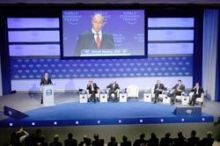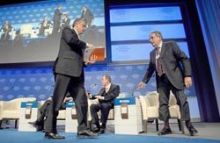The world closely followed the events in the Swiss city of Davos, hoping to hear about a way to save the world economy. Observers note, however, that the hopes pinned on the Davos wise men may fail. The Guardian says the forum makes it increasingly clear that no one has anything specific to suggest except reviving the world that has just perished.
Davos, it should be noted, is a political and economic rather than just economic event. In 2008 the opening address was made by US Secretary of State Condoleezza Rice, whereas in 2009 it was Russian Prime Minister Vladimir Putin and his Chinese counterpart Wen Jiabao. Thus, says the BBC, the forum organizers themselves provided an answer to the stated topic of building a post-crisis world. Whatever the new world order, the new voices on the international arena are increasingly louder and the US role in global politics will not be as important as it was before the crisis.
Addressing the opening ceremony of the World Economic Forum in Davos, Vladimir Putin drew a picture of a strong, self-confident country. Even if affected by the global crisis, it has enough financial resources to withstand it. Referring to the ongoing crisis, he said: “There is, I believe, a fairly well-known concept such as ‘the perfect storm.’ That is when the unleashed natural elements focus in one point of the ocean and continue to build up their destructive force manifold. The current crisis looks precisely like ‘the perfect storm.’” According to The Guardian, we all know there is little, if anything, we can do to combat the elements and the Russian prime minister offered no constructive proposals, contenting himself with generalities. In fact, no one expected Putin to come up with his “plan.”
Addressing the forum, Putin essentially admitted that Russia’s economy, which heavily relies on exports of raw materials, was affected by the crisis worse than other exporting countries that do not specialize in raw materials. To avoid such excesses, his country intends to become a big-time exporter of foods and high-tech goods: “History gives our country a unique chance. The way events unfold requires that we reform our economy and modernize our social sphere. And we are not going to miss this chance.” In response, kasparov.ru acidly points out that Putin’s address to the forum was more like a presidential candidate’s campaign speech.
Compared to Russia’s good promotional stand in Davos, that of Ukraine left much to be desired as neither President Viktor Yushchenko, nor Prime Minister Yulia Tymoshenko was in attendance. Instead, there were NSDC Secretary Raisa Bohatyriova and Deputy Prime Minister Hryhorii Nemyria. Interestingly, Yushchenko initially planned on coming to Davos (he is even on the list of the forum participants). On the other hand, the Pinchuk Foundation distinguished itself by organizing a philanthropy roundtable with Microsoft founder Bill Gates, 2006 Nobel Peace Prize winner Muhammad Yunus, British ex-Prime Minister Tony Blair, US ex-President Bill Clinton, actor and philanthropist Jet Li, and UK businessman and philanthropist Sir Richard Branson.
The forum was not uneventful. The Agence France-Presse reports a verbal sparring between Turkish Prime Minister Recep Tayyip Erdogan and Israeli President Shimon Peres over the fighting in Gaza. Erdogan was outraged by the panel moderator, the columnist David Ignatius of The Washington Post who cut short his response to Peres’s eloquent presentation that lasted some 25 minutes and drew applause. The Israeli head of state declared: “The tragedy of Gaza is not Israel, it’s Hamas, who created a dictatorship, a very ugly one.” Erdogan had only several minutes to counter Peres’s arguments, but enough to accuse Israel of “barbarous” operations in Gaza and destruction of civilians.
Tehran’s statement that it was prepared to cooperate with President Barack Obama to improve relations with Washington came as a pleasant surprise, even though Washington was not adequately represented at the forum: Obama could not attend and sent his top adviser Valerie Jarrett. The official explanation was that the previous administration was gone and the new one was still being formed.
The BBC says the 40th World Economic Forum in Davos was very different from the previous ones, even if in terms of participants. In 2009 a total of 2,500 people attended, a record number as compared to the previous year. Markedly fewer financiers participated. Bankers, who only recently were exuding confidence and calm, are now ashamed to communicate with people of the economic and political elite after the last year’s embarrassment. Instead, there were more than enough politicians, including Putin, Wen Jiabao, their British and Japanese counterparts Gordon Brown and Taro Aso, and German Chancellor Angela Merkel. This shift in attendance is easily explained. Banks and companies turned out to be unable to cope with the crisis, just as the concept of a free, totally unrestricted marked suffered a total fiasco. So it is up to governments to get the world economy out of the crisis.








